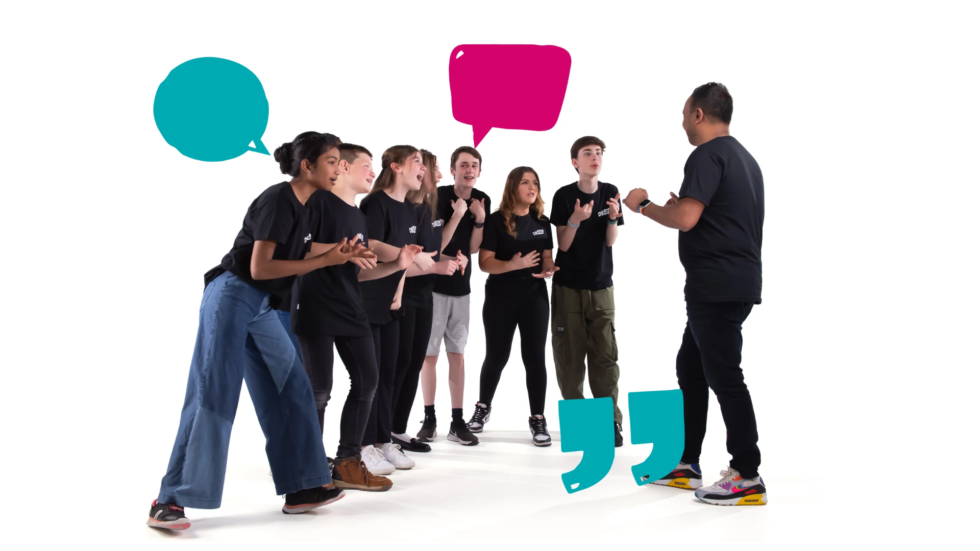Drama Kids classes are an excellent way to support Social Emotional Learning (SEL) because they provide students with opportunities to explore, understand, and manage emotions, build positive relationships, and make responsible decisions. Here’s how our Award Winning Drama Program helps foster SEL:
1. Promotes Self-Awareness
- Exploring Emotions: In drama, students take on various roles and characters, which helps them explore different emotions. Acting out different emotional states allows students to reflect on their own feelings, build self-awareness, and recognize how emotions can influence behavior. For example, a student might perform a scene where a character is angry or sad, which helps them understand how to identify and express those emotions in real life.
- Reflection: After performing, students often engage in discussions about their roles and how they felt during the activity, which encourages self-reflection and a deeper understanding of their emotional responses. This builds emotional intelligence and helps them identify their strengths and areas for growth.
2. Enhances Empathy
- Understanding Others: Drama encourages students to step into the shoes of different characters, including those with backgrounds, experiences, or emotions different from their own. This process helps them develop empathy, as they learn to understand the perspectives of others, even if they don’t share the same life experiences.
- Perspective-Taking: By playing diverse roles, students explore various social dynamics and how characters react to situations. This enhances their ability to empathize with people in real life, improving their social relationships and emotional connections with others.
3. Builds Social Skills
- Collaboration and Teamwork: Drama is inherently a collaborative activity. Whether students are working on a group scene, improvising, or rehearsing for a performance, they must learn how to cooperate, listen to one another, and work toward a common goal. These experiences help them practice important social skills such as communication, cooperation, and conflict resolution.
- Active Listening: To perform effectively in drama, students must listen carefully to each other’s lines, cues, and body language. This active listening promotes positive communication skills and strengthens interpersonal relationships both inside and outside the classroom.
- Conflict Resolution: Drama often involves resolving conflicts between characters, which allows students to explore various solutions and understand different approaches to problem-solving. This teaches students how to manage real-life conflicts in constructive and empathetic ways.
4. Improves Emotional Regulation
- Expressing and Managing Emotions: Drama encourages students to express a wide range of emotions, helping them practice managing and controlling their emotional responses. Whether they are acting out a scene where they must deal with frustration or joy, students learn to regulate how they express emotions and recognize the impact their emotions have on others.
- Stress Relief and Relaxation: Performing in drama can be a fun and creative outlet, providing emotional release and stress relief. By engaging in imaginative play, students can process their emotions in a healthy and productive way, which contributes to emotional well-being.
5. Fosters Self-Confidence
- Overcoming Stage Fright: Performing in front of others can be intimidating, but through repeated exposure, students gain confidence in their abilities. Drama classes provide a safe space for students to practice public speaking, act, and express themselves in front of an audience, which builds self-esteem and confidence.
- Taking Risks: Drama encourages students to take creative risks, whether through improvisation or portraying challenging characters. This risk-taking helps them build resilience and adaptability, as they learn to handle mistakes and improve from them.
6. Supports Positive Behavior
- Respect and Responsibility: In drama classes, students are often required to respect their classmates’ ideas, space, and contributions. By taking turns, sharing the stage, and following directions, students learn to value cooperation and mutual respect, reinforcing positive behaviors in the classroom.
- Building a Safe Environment: Drama classes provide a safe space for students to explore different roles and emotions without fear of judgment. This environment fosters trust, emotional safety, and positive relationships, helping students feel secure enough to express themselves and take risks.
7. Teaches Decision-Making
- Making Choices in Role-Playing: Drama involves many decisions, from how to portray a character to how to interact with others in a scene. Students practice making choices based on their understanding of the characters, situations, and emotions involved. These decision-making skills translate to real-life situations where students must navigate choices thoughtfully and responsibly.
- Ethical Choices: Many drama activities involve characters making moral or ethical decisions. Students explore these dilemmas in a creative context, which helps them develop a better understanding of values such as fairness, honesty, and respect in real-life situations.
8. Encourages Reflection and Dialogue
- Classroom Discussions: After drama exercises, students often engage in reflective discussions where they can share their thoughts on the emotions or behaviors of the characters they portrayed. These discussions encourage students to verbalize their feelings, listen to others, and build a deeper understanding of both their own and others’ emotional experiences.
- Feedback and Growth: Drama provides students with opportunities to give and receive constructive feedback. This process encourages self-improvement, helps students learn to accept criticism, and fosters a growth mindset, all of which are important components of SEL.
Drama is a powerful tool for supporting Social Emotional Learning (SEL) because it helps students develop essential skills such as self-awareness, empathy, emotional regulation, communication, and problem-solving. Through role-playing, collaboration, and self-expression, students learn how to navigate social and emotional challenges in a safe and supportive environment. Drama not only enriches students’ emotional intelligence but also provides them with the tools to build positive relationships, make responsible decisions, and thrive in various social contexts. Learn more about Drama Kids In-School programs click here
Interested to open your own Drama Kids Academy with multiple revenue streams; After – School, In-School, Camps, Birthday Parties and more.. click here
Our home-based children’s educational business is a low-cost investment, ideal for anyone passionate about guiding and inspiring kids.
Join Drama Kids and become part of an incredible journey that allows you to fulfil your dream of owning your own business, and make a real difference.
